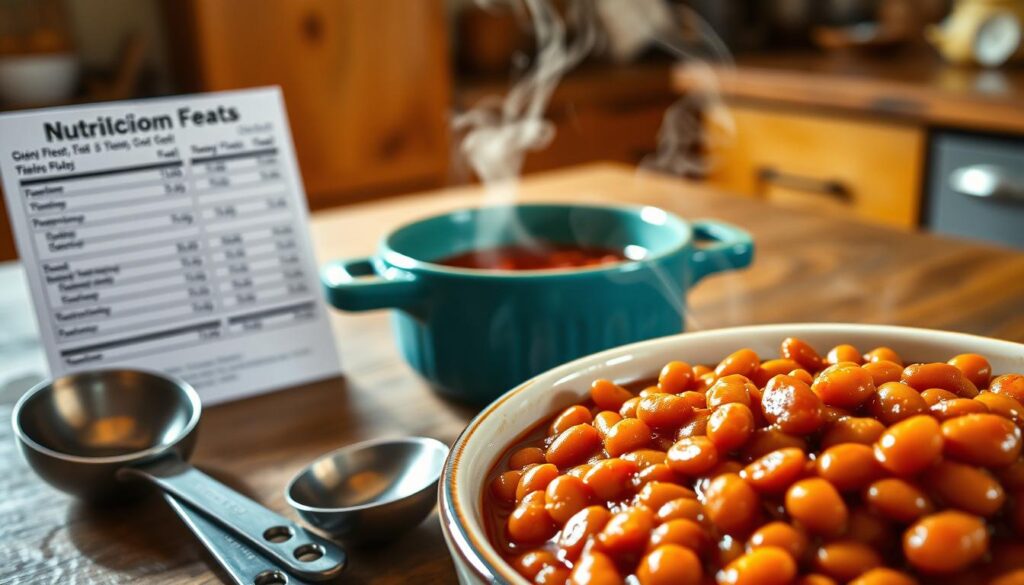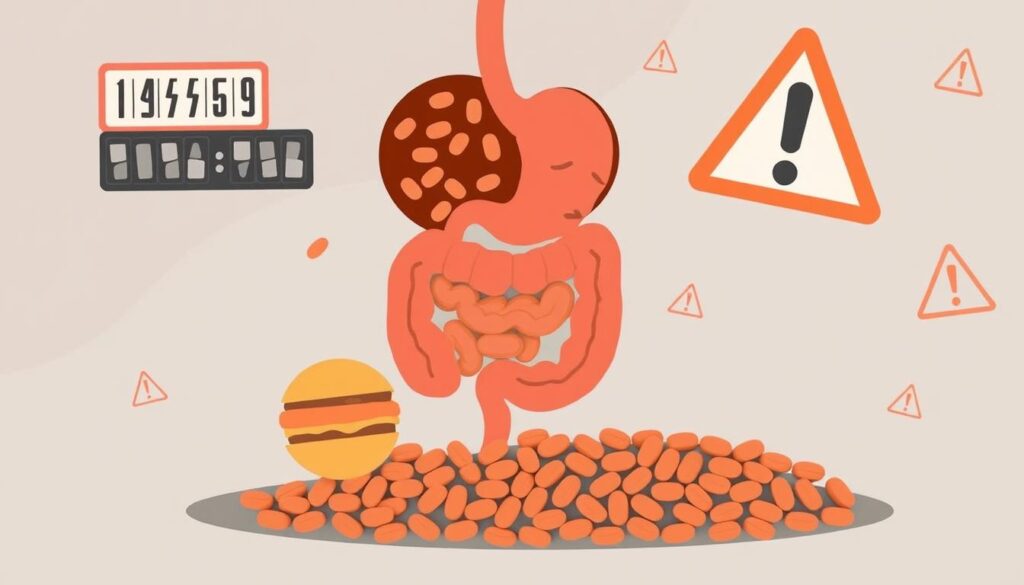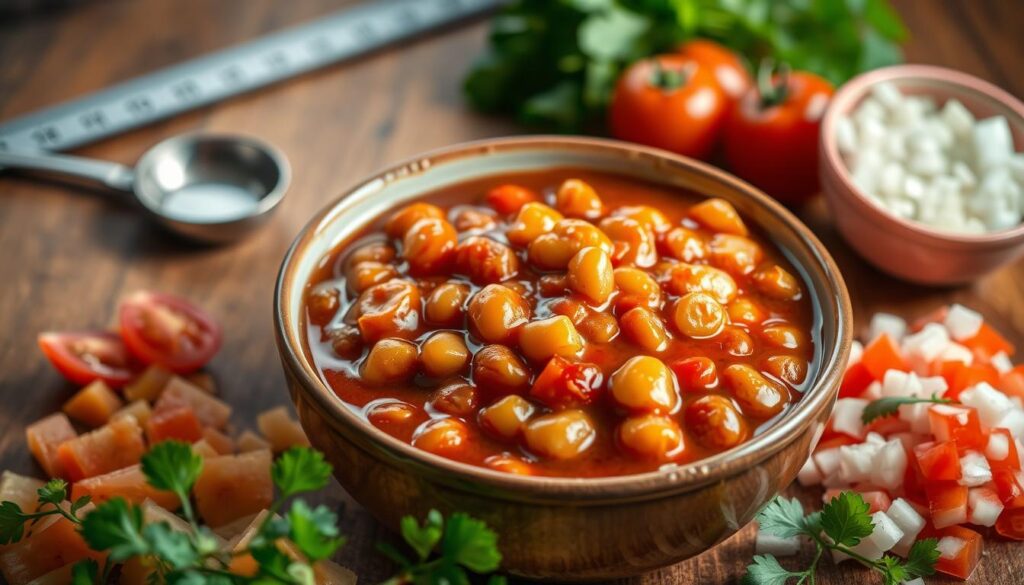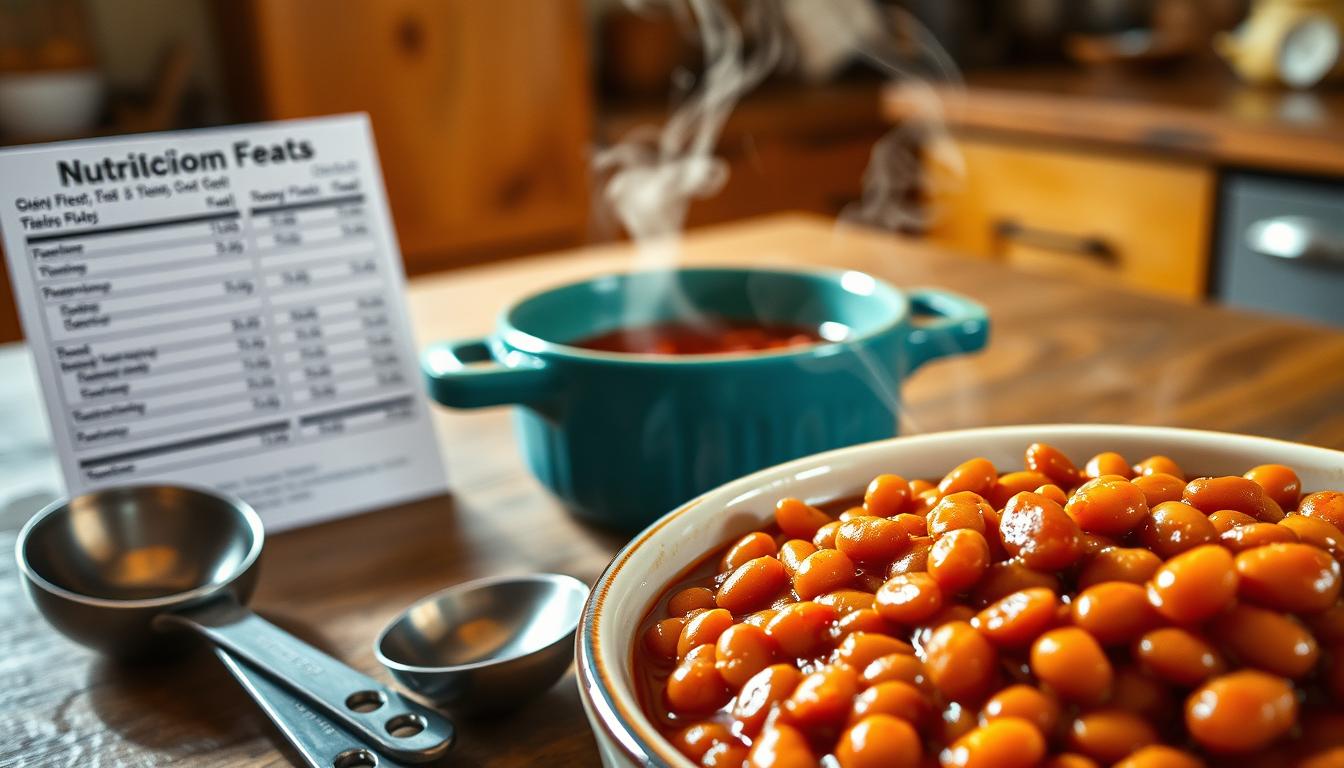Baked beans are a favorite for many, but their nutritional value is a big question. This guide will cover the calories and nutrients in baked beans. It will also talk about their health benefits and downsides. You’ll learn how to pick healthier baked beans for your meals.
- What are Baked Beans?
- Nutrient Breakdown of Baked Beans
- Health Benefits of Baked Beans
- Potential Drawbacks of Baked Beans
- How Many Calories in Baked Beans?
- Healthier Alternatives to Canned Baked Beans
- Tips for Incorporating Baked Beans into a Balanced Diet
- Conclusion
- FAQ
- Q: What are the common ingredients and preparation methods for baked beans?
- Q: What is the nutrient breakdown of baked beans?
- Q: What are the possible health benefits of baked beans?
- Q: What are the possible drawbacks of baked beans?
- Q: How many calories are in baked beans?
- Q: What are some healthier alternatives to canned baked beans?
- Q: How can baked beans be incorporated into a balanced diet?

Baked beans are a common choice for a quick, tasty meal. Knowing their nutritional facts is key to a healthy diet. We’ll dive into the calories and nutrients in baked beans. This will help us see their good points and any not-so-good ones.
What are Baked Beans?
Baked beans are a favorite dish in the United States. They are made with navy beans cooked in a tasty sauce. You can make them from scratch or buy them in cans.
The sauce has tomato, sugar, and sometimes a bit of pork for extra flavor.
Common Ingredients and Preparation Methods
The key ingredients in baked beans are navy beans, sugar, herbs, spices, tomato sauce, vinegar, and molasses. Sometimes, a little bacon or salt-cured pork is added for more taste. You can cook baked beans by baking, simmering on the stovetop, or slow cooking.
There are many types of baked beans to try. Here are a few:
- Traditional Baked Beans – Made with navy beans in a tomato-based sauce, often with a touch of sweetness from brown sugar or molasses.
- Vegetarian Baked Beans – Prepared without any pork products, relying on plant-based ingredients to create a savory and satisfying dish.
- Flavored Baked Beans – Infused with additional seasonings like chili powder, cumin, or barbecue sauce for a unique twist on the classic recipe.
Baked beans are comforting and nutritious. They’re great for breakfast, brunch, side dishes, or even as a main course.
Nutrient Breakdown of Baked Beans
Baked beans are a nutritious and versatile legume dish. They offer essential vitamins, minerals, and macronutrients. A 1/2-cup serving of canned baked beans has about 119 calories, 27 grams of carbs, 6 grams of protein, and 5 grams of fiber. They are also rich in thiamine, zinc, selenium, and other important micronutrients.
The nutrient profile of baked beans can change based on the brand and recipe. But they generally have a good mix of fiber, plant-based protein, and essential vitamins and minerals. For example, a 1-cup serving of homemade baked beans has 151 calories, 21 grams of carbs, 6 grams of protein, and 6 grams of fiber.
| Nutrient | Amount per 1/2 Cup Canned Baked Beans | % of RDI |
|---|---|---|
| Calories | 119 | – |
| Total Fat | 0.5 g | – |
| Carbohydrates | 27 g | – |
| Fiber | 5 g | – |
| Protein | 6 g | – |
| Sodium | 462 mg | 19% |
| Potassium | 179 mg | 6% |
| Iron | 1.3 mg | 8% |
| Thiamine (B1) | 0.2 mg | 10% |
| Zinc | 1.3 mg | 26% |
| Selenium | 7.7 mcg | 11% |
The baked beans nutrition facts show they are packed with essential nutrients. This makes them a great addition to a healthy diet. Knowing the nutritional value of baked beans helps us make better food choices.
Health Benefits of Baked Beans
Baked beans are more than just a tasty side dish. They are packed with fiber, protein, and essential vitamins and minerals. This makes them a great choice for boosting your health and wellness.
Rich in Fiber, Protein, and Essential Nutrients
A half-cup (130 grams) of canned vegetarian baked beans has 130 calories. It also has 6.01 grams of protein and 5.98 grams of fiber. This is 25% of the daily fiber you need.
Baked beans are also a good source of minerals. They have 59.8 mg of calcium (6% of the daily value) and 1.79 mg of iron (10% of the daily value).
May Support Gut Health
The fiber in baked beans can help with digestion and regular bowel movements. The plant compounds in them may also protect against colon cancer.
Potential to Lower Cholesterol Levels
The fiber and phytosterols in baked beans can lower cholesterol. This reduces the risk of heart disease. A half-tin of baked beans has 8g of fiber, which is 27% of what you need daily.
The health benefits of baked beans make them a smart choice for your diet. Adding baked beans to your meals can bring many nutritional advantages. It’s a great way to support your overall health and well-being.
Potential Drawbacks of Baked Beans
Baked beans can be good for you, but there are some downsides. Canned baked beans have a lot of added sugars and sodium. This can be bad for those who need to watch their intake. They also have food additives like modified cornstarch and caramel coloring, which some people don’t like.
Also, the cans for baked beans might have bisphenol A (BPA). BPA has been linked to health problems. Making baked beans yourself lets you control what goes into them, avoiding these issues.
High in Added Sugars and Sodium
Canned baked beans have a lot of added sugars and sodium. This is a problem for those who are careful about what they eat. A can of baked beans can have up to 25% of the daily sodium limit. Too much sodium can lead to high blood pressure and heart problems.
Presence of Food Additives and BPA Contaminants
Commercial baked beans often have food additives like modified cornstarch and caramel coloring. These are used for texture and color, but some people don’t want them. The cans might also have bisphenol A (BPA), which is linked to endocrine issues and health problems.
| Nutrient | Canned Baked Beans (1/2 cup) | Homemade Baked Beans (1/2 cup) |
|---|---|---|
| Calories | 130 | 105 |
| Carbohydrates | 23g | 18g |
| Fiber | 4g | 6g |
| Sugars | 8g | 2g |
| Sodium | 450mg | 170mg |

Making baked beans yourself lets you control what goes into them. This way, you can avoid the high amounts of added sugars, sodium, and food additives found in canned beans. It makes for a healthier and more wholesome dish.
How Many Calories in Baked Beans?
The calorie content of baked beans changes with the brand and recipe. A typical 1/2-cup serving of canned baked beans has about 119 calories. This calorie count can go up if the beans have added sugars or if you eat more. Homemade baked beans might have different calories based on what you add.
A 1/2-cup (130 g) serving of Bush’s Best Original Baked Beans has:
- 150 calories
- Calorie breakdown: 8% fat, 74% carbs, 17% protein
- 30% Total Carbohydrates
- 18% Dietary Fiber
- 22% of sugars include 11g of added sugars
- 25% of Sodium
- 11% of Iron
- 8% of Potassium
- Total Fat: 1.5g
- Protein: 7g
- 4% of Calcium
The amount of calories in baked beans can vary. Knowing the calorie content of baked beans helps if you’re watching your calories.

Healthier Alternatives to Canned Baked Beans
Looking for a healthier version of baked beans? Making them from scratch with dried navy beans is a great choice. This way, you can control what goes into your dish, cutting down on added sugars and sodium found in canned beans.
Homemade Baked Beans: Controlling Ingredients
Homemade baked beans offer a nutritious twist on the classic dish. They are packed with fiber and protein, making them a good choice for those who follow a vegan or dairy-free diet. Plus, they don’t have any refined sugars.
One serving of homemade baked beans has about 85 calories. That’s much less than the 198 calories in a typical can. This makes them a healthier option for your meals.
Canned baked beans often have a lot of added sugars and preservatives. Making your own homemade baked beans lets you enjoy the taste without the unhealthy additives. It’s a way to make a wholesome and nutritious dish that you’ll love.
Want to cut down on added sugars and sodium? Or maybe you just want to make baked beans your own way? Making homemade baked beans is a healthier choice than canned ones. It lets you choose the ingredients, making a dish that fits your dietary needs and tastes.
Tips for Incorporating Baked Beans into a Balanced Diet
Baked beans can add nutrition to your diet if eaten in the right amounts. It’s key to watch portion sizes, sugar, and salt. This helps keep your diet balanced and healthy.
To make baked beans healthier, pair them with foods rich in nutrients. Try them on quinoa with roasted broccoli and grilled chicken. This mix offers a variety of nutrients in one meal.
Choosing low-sugar, low-sodium baked beans is another smart move. Or, make them yourself to control what goes into them. This way, you can stick to your healthy eating goals.
Baked beans are great for a balanced diet. They can be a side dish, added to soups, or even on baked potatoes. Just be careful with how much you eat and pick healthier options.
The secret to adding baked beans to a healthy diet is to do it in moderation. Pair them with other nutritious foods and consider their nutritional value. This way, you can enjoy their benefits without overdoing it.
Conclusion
Baked beans are a nutritious and easy food to eat. They are full of fiber, plant-based protein, and important vitamins and minerals. But, it’s key to watch out for added sugars, sodium, and food additives in many canned beans.
By making baked beans yourself or picking healthier canned ones, you can enjoy their benefits. This way, you can avoid the downsides of this classic dish.
The nutrition in baked beans is impressive. They are rich in fiber, protein, and nutrients like iron, magnesium, and potassium. These help with health and wellness, like carrying oxygen and regulating muscles.
They also support gut health and can help lower cholesterol when eaten as part of a balanced diet. This shows the value of baked beans in a healthy meal plan.
Adding baked beans to a diet full of other healthy foods is a smart move. Knowing what baked beans offer can help you make better food choices. This aligns with your health goals and tastes.
FAQ
Q: What are the common ingredients and preparation methods for baked beans?
A: Baked beans are made with navy beans, tomato sauce, sugar, and spices. Sometimes, a bit of bacon or salt-cured pork is added. They can be baked, simmered on the stovetop, or slow cooked.
Q: What is the nutrient breakdown of baked beans?
A: A 1/2-cup of canned baked beans has about 119 calories. It has 27 grams of carbs, 6 grams of protein, and 5 grams of fiber. They also offer thiamine, zinc, selenium, and other vitamins and minerals.
Q: What are the possible health benefits of baked beans?
A: Baked beans are rich in fiber, protein, and nutrients. This can boost overall health. The fiber helps with digestion and may lower cholesterol, reducing heart disease risk.
Q: What are the possible drawbacks of baked beans?
A: Canned baked beans often have high sugar and sodium. They may also include additives like modified corn starch. The cans might contain BPA, linked to health issues.
Q: How many calories are in baked beans?
A: Baked beans’ calories vary by brand and recipe. A typical 1/2-cup serving has about 119 calories. Homemade versions can have different calorie counts based on ingredients.
Q: What are some healthier alternatives to canned baked beans?
A: Making baked beans from scratch lets you control ingredients. This way, you can reduce sugars and sodium. It’s a chance to make a healthier, customized dish.
Q: How can baked beans be incorporated into a balanced diet?
A: Baked beans can be part of a healthy diet when eaten in moderation. Be mindful of portion sizes and ingredients. Pairing them with whole grains, veggies, and lean proteins makes for a balanced meal.









